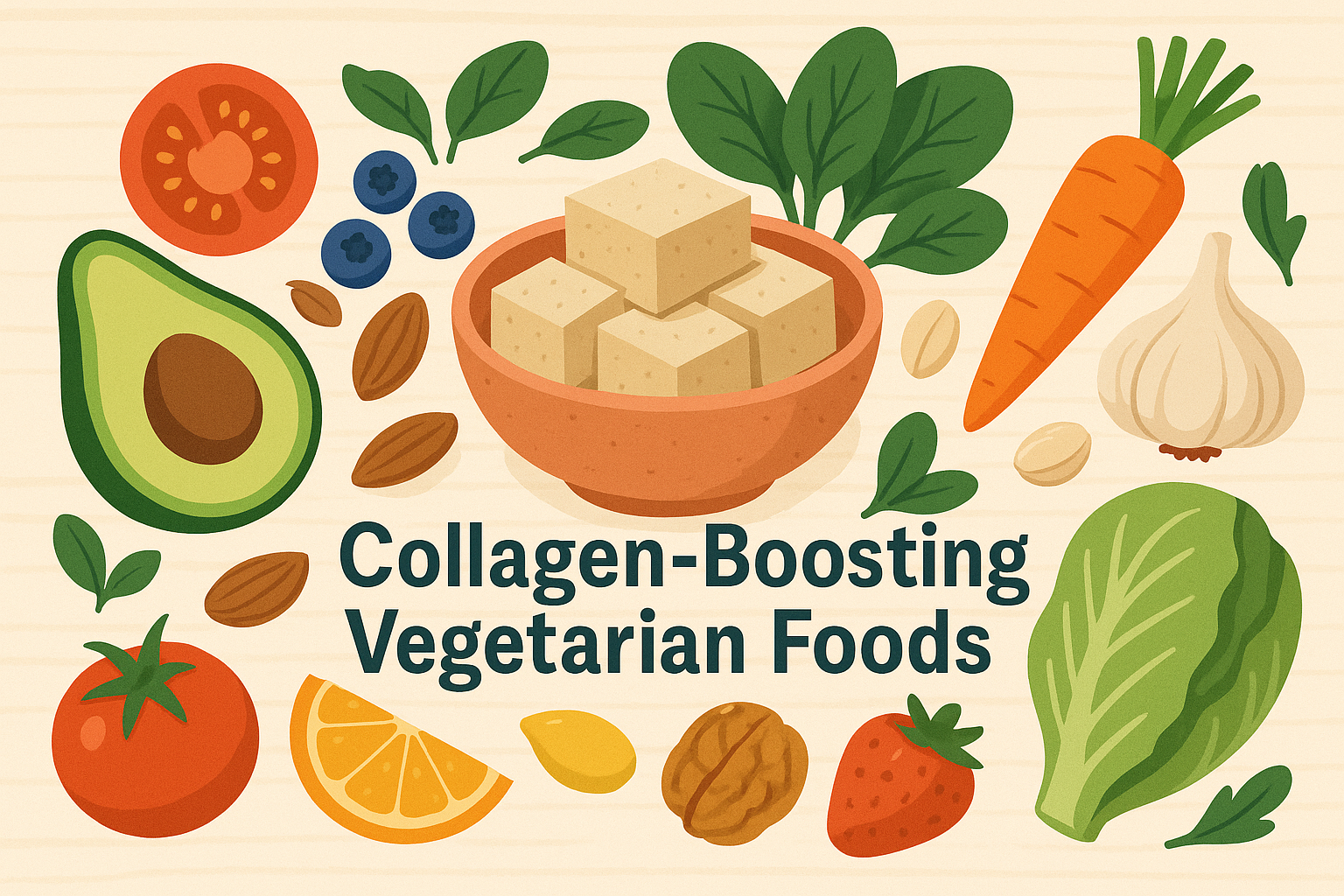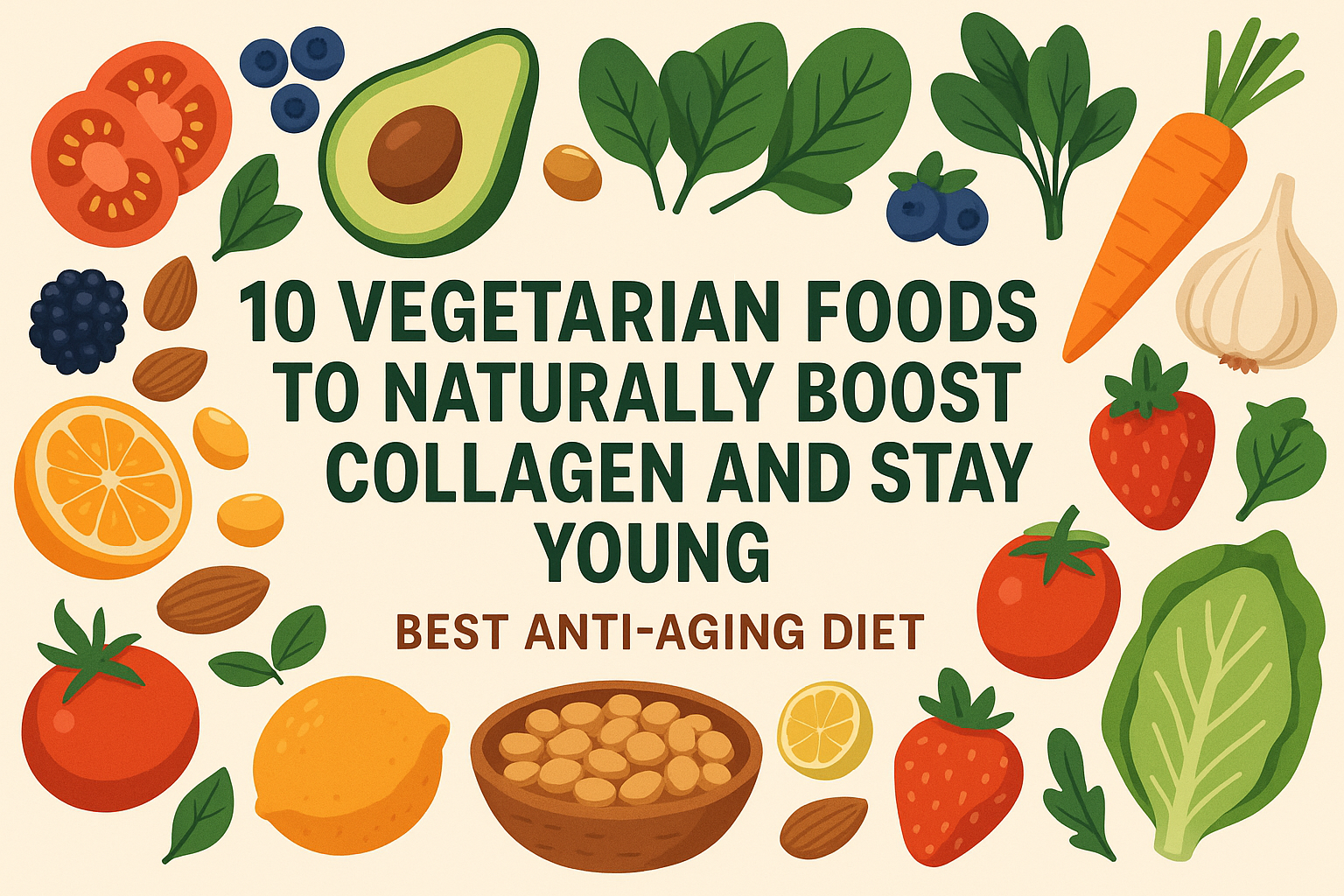
Stay Young and Radiant: 10 Vegetarian Foods That N
Discover the top 10 vegetarian foods to naturally boost collagen and stay young. Learn how plant-bas

Aging is a natural process, but the way our skin, hair, and joints age can be influenced by what we eat. At the heart of this process lies collagen, the most abundant protein in the human body. Collagen keeps skin smooth, joints flexible, and hair strong. Unfortunately, as we age, collagen production declines—leading to wrinkles, sagging skin, and stiffness.
But here’s the good news: you don’t need animal products or expensive supplements to support collagen production. A carefully planned vegetarian anti-aging diet can provide the nutrients your body needs to naturally boost collagen and help you stay youthful.

Collagen is often referred to as the “glue” that holds our body together. It maintains:
Skin elasticity and hydration
Joint flexibility and cushioning
Hair thickness and nail strength
After age 25, collagen production begins to decrease gradually. By the time we reach 40, this decline accelerates, contributing to visible signs of aging. Environmental factors such as UV exposure, smoking, high sugar intake, and stress further speed up this loss.
Unlike bone broth or animal collagen powders, vegetarian diets rely on nutrients that stimulate the body’s own collagen production. Certain vitamins, minerals, and plant compounds act as building blocks for collagen formation.
Vitamin C: Essential for collagen cross-linking, found in citrus, peppers, and greens.
Zinc: Helps repair damaged tissues, found in nuts, seeds, and legumes.
Copper: Supports collagen fiber formation, found in leafy greens and whole grains.
Oranges, lemons, and grapefruits are packed with vitamin C, which triggers collagen synthesis and fights free radical damage.
Spinach, kale, and arugula are rich in chlorophyll, which may boost skin collagen and protect against UV damage.
Strawberries, blueberries, and blackberries provide ellagic acid and vitamin C, both vital for preventing collagen breakdown.
Garlic contains sulfur, which strengthens collagen fibers, and taurine, which helps repair damaged collagen.
Almonds, walnuts, chia seeds, and flaxseeds offer omega-3s and amino acids necessary for collagen formation.
Beans, lentils, and chickpeas are excellent protein sources, providing amino acids that help build collagen naturally.
Avocados are rich in vitamin E and healthy monounsaturated fats, which protect collagen from oxidative stress.
Tofu, tempeh, and soy milk contain isoflavones that may improve skin elasticity and slow collagen loss.
Tomatoes are loaded with lycopene, an antioxidant that shields skin from UV damage while supporting collagen.
Carrots provide beta-carotene, which converts to vitamin A—helping maintain youthful, firm skin.
Adequate water intake and deep sleep are critical for collagen regeneration.
Chronic stress and excess sugar accelerate collagen breakdown, so mindfulness and a balanced diet are key.
Both smoking and UV rays significantly damage collagen fibers—making protection essential.
Collagen powders and capsules can be convenient, but they are often derived from animal sources, making them unsuitable for strict vegetarians.
Whole plant-based foods not only stimulate collagen production but also supply antioxidants and fiber—ensuring long-term skin, joint, and overall health.
1. Can vegetarians get enough collagen without animal products?
Yes! While collagen itself is animal-based, vegetarians can boost natural collagen production through vitamin C-rich and protein-packed plant foods.
2. How long does it take to see results from collagen-boosting foods?
Most people notice improvements in skin texture and energy within 6–12 weeks of consistent dietary changes.
3. Is vitamin C really necessary for collagen synthesis?
Absolutely. Without vitamin C, collagen cannot form properly, making it the most important nutrient for vegetarians.
4. Are collagen supplements safe for vegetarians?
Most collagen supplements are animal-derived. Vegetarians should choose plant-based boosters like hyaluronic acid, biotin, and vitamin C supplements.
5. Which foods are best for skin elasticity?
Soy, avocados, and berries are among the best vegetarian options for maintaining youthful, elastic skin.
6. Can lifestyle changes alone improve collagen levels?
Yes, but combining diet with hydration, exercise, and sun protection maximizes collagen preservation.
Collagen may decline with age, but your anti-aging diet doesn’t need to rely on animal products. By adding citrus fruits, leafy greens, berries, legumes, nuts, soy, avocados, and other vegetarian superfoods, you can support collagen naturally—keeping your skin glowing, joints strong, and body youthful.
A collagen-boosting vegetarian lifestyle is more than just a diet—it’s a long-term investment in your health, beauty, and vitality.
For more science-backed health insights, check out Harvard Health on Nutrition and Skin Health.